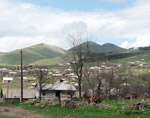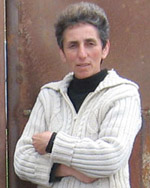Crisis Victim: Government Has No Money to Supply Sverdlov with Clean Water
 Sverdlov is a poor and remote community in Lori Marz. It is close to neighboring Georgia than to the regional center of Vanadzor. It would seem that its remoteness has left this community of 1,200 to fend for itself when trying to tackle its problems. The most pressing problem is to supply residents with potable water. Now, they drink water that flows down from the mountains.
Sverdlov is a poor and remote community in Lori Marz. It is close to neighboring Georgia than to the regional center of Vanadzor. It would seem that its remoteness has left this community of 1,200 to fend for itself when trying to tackle its problems. The most pressing problem is to supply residents with potable water. Now, they drink water that flows down from the mountains.
The Hygienic Anti-Epidemic Center has prohibited Sverdlov residents from drinking this water and using it for cooking purposes. Sverdlov Mayor Kamsar Cherqezyan has advised residents to boil the water before using it. “The sanitary unit also prohibits the use of boiled water,” says the mayor, adding that they haven’t found any illnesses linked to the water. Local residents would beg to differ. Olga Mouradyan remembers that children were afflicted with intestinal maladies about a year and a half ago. The school was shut down for ten days because pupils suffered from diarrhea. Later on the school’s cafeteria closed as well. Mrs. Mouradyan ferries drinking water in buckets on a cart from a spring at the entrance to the village. Once home, she boils the water.  “These two houses of ours get water from wells but the water isn’t for drinking. We get drinking water from down below in the village. We carry a few pails and boil it first. Let me tell you it tastes awful,” says Satenik Dolmazyan, who came to Sverdlov as a bride twenty years ago. She says she hasn’t tasted normal water since. The village women can only dream about using washing machines. “The local water is so bad that the machines break down,” says Mrs. Dolmazyan. Sverdlov was supplied with drinking water during Soviet times. A 7 kilometer pipe from Stepanavan carried the precious liquid to the village. “People were using washing machines back then. The water was distributed equally. Later on the system fell into disrepair and was never fixed. Thus, we have no water today,” recounts the mayor. The mayor believes it makes more sense to pipe the water flowing freely from the mountains than to use the faulty system. “Our mountain water is better, since it is gravity fed,” argues the mayor. By his calculations it would cost 12 million drams to pipe the mountain water to the village. This is the total amount of the community’s yearly budget. This amount is needed to lay 7 kilometers of pipe and to build a purification station. Ten percent of the cost will be covered by World Vision and the Dutch organization “Women for a Clean Environment” in conjunction with the Stepanavan “Lori” environmental club. The club’s president, Manya Meliqtchanyan, says they will allocate needed equipment, not money. “We will supply the pipe and materials, but they will have to do the construction work.” Sverdlov residents are willing to band together and do the work themselves. However, outside investment will only cover the cost of 2.5 kilometers of the necessary 7 kilometer pipe. Sverdlov’s mayor has decided to apply to the RoA government and other international organizations for the balance. He says that the state government in Yerevan is aware of the problem but claims that it can’t lend a helping hand due to the economic crisis. Thus, the hopes of the village rest with international donors or on its own resources. “If the villagers work well and pay their taxes in a timely fashion, we will be able to lay the pipe,” says Mayor Cherqezyan. In 2008, only 60% of forecasted taxes were collected. The main problem, according to the mayor, is the lands that go uncultivated. 70-80% of village residents are poor and don’t have the means to work the land. “Being a remote village, we are probably shunted aside and totally neglected. It’s not only water issue. Last year children in the village fell sick and suffered from diarrhea. You can’t drink the water without first boiling it. Half the year we have no water at all because it freezes up. It’s only during the rainy season that the water flows,” protests local resident Artour Mouradyan. Any villager that has the means leaves Sverdlov to find work abroad. But due to the economic crisis, villagers have been deprived of this option as well. Residents of Sverdlov are hopeful that by autumn they will have come up with a solution to their problem and that they will be drinking clean water.
“These two houses of ours get water from wells but the water isn’t for drinking. We get drinking water from down below in the village. We carry a few pails and boil it first. Let me tell you it tastes awful,” says Satenik Dolmazyan, who came to Sverdlov as a bride twenty years ago. She says she hasn’t tasted normal water since. The village women can only dream about using washing machines. “The local water is so bad that the machines break down,” says Mrs. Dolmazyan. Sverdlov was supplied with drinking water during Soviet times. A 7 kilometer pipe from Stepanavan carried the precious liquid to the village. “People were using washing machines back then. The water was distributed equally. Later on the system fell into disrepair and was never fixed. Thus, we have no water today,” recounts the mayor. The mayor believes it makes more sense to pipe the water flowing freely from the mountains than to use the faulty system. “Our mountain water is better, since it is gravity fed,” argues the mayor. By his calculations it would cost 12 million drams to pipe the mountain water to the village. This is the total amount of the community’s yearly budget. This amount is needed to lay 7 kilometers of pipe and to build a purification station. Ten percent of the cost will be covered by World Vision and the Dutch organization “Women for a Clean Environment” in conjunction with the Stepanavan “Lori” environmental club. The club’s president, Manya Meliqtchanyan, says they will allocate needed equipment, not money. “We will supply the pipe and materials, but they will have to do the construction work.” Sverdlov residents are willing to band together and do the work themselves. However, outside investment will only cover the cost of 2.5 kilometers of the necessary 7 kilometer pipe. Sverdlov’s mayor has decided to apply to the RoA government and other international organizations for the balance. He says that the state government in Yerevan is aware of the problem but claims that it can’t lend a helping hand due to the economic crisis. Thus, the hopes of the village rest with international donors or on its own resources. “If the villagers work well and pay their taxes in a timely fashion, we will be able to lay the pipe,” says Mayor Cherqezyan. In 2008, only 60% of forecasted taxes were collected. The main problem, according to the mayor, is the lands that go uncultivated. 70-80% of village residents are poor and don’t have the means to work the land. “Being a remote village, we are probably shunted aside and totally neglected. It’s not only water issue. Last year children in the village fell sick and suffered from diarrhea. You can’t drink the water without first boiling it. Half the year we have no water at all because it freezes up. It’s only during the rainy season that the water flows,” protests local resident Artour Mouradyan. Any villager that has the means leaves Sverdlov to find work abroad. But due to the economic crisis, villagers have been deprived of this option as well. Residents of Sverdlov are hopeful that by autumn they will have come up with a solution to their problem and that they will be drinking clean water.
 Videos
Videos Photos
Photos
Write a comment